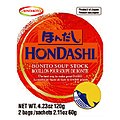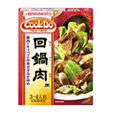Ajinomoto
-
Ajinomoto
-
Ajinomoto
-
Ajinomoto
-
Ajinomoto
-
Ajinomoto
-
Ajinomoto
-
Ajinomoto
-
Ajinomoto
-
Ajinomoto
-
Ajinomoto
-
Ajinomoto
-
Ajinomoto
Ajinomoto[edit]
Ajinomoto is a Japanese food and biotechnology corporation that produces seasonings, cooking oils, frozen foods, beverages, sweeteners, amino acids, and pharmaceuticals. The company is best known for its production of monosodium glutamate (MSG), a flavor enhancer that is widely used in cooking.
History[edit]
Ajinomoto was founded in 1909 by Kikunae Ikeda, a Japanese chemist who discovered the umami taste, which is one of the five basic tastes alongside sweet, sour, bitter, and salty. Ikeda isolated glutamic acid as the source of umami and developed a method to produce MSG from wheat. The company was established to commercialize this discovery, and it quickly became a major player in the food industry.
Products[edit]
Ajinomoto's product line includes a variety of food products and ingredients:
- Seasonings: Ajinomoto produces a range of seasonings, including MSG, which is marketed under the brand name "Ajinomoto". Other seasonings include dashi, soy sauce, and various spice blends.
- Cooking Oils: The company offers a selection of cooking oils, including vegetable oils and specialty oils for different culinary applications.
- Frozen Foods: Ajinomoto manufactures a wide array of frozen foods, such as gyoza, ramen, and other ready-to-eat meals.
- Beverages: The company produces various beverages, including coffee and tea products.
- Sweeteners: Ajinomoto is involved in the production of sweeteners, including aspartame, which is used in many low-calorie and sugar-free products.
- Amino Acids: The company is a leading producer of amino acids, which are used in food, pharmaceuticals, and animal nutrition.
Biotechnology and Pharmaceuticals[edit]
Ajinomoto has expanded its operations into the biotechnology and pharmaceutical sectors. The company develops and manufactures amino acids and other compounds for use in pharmaceuticals, nutraceuticals, and cosmetics. Ajinomoto's biotechnology division focuses on the development of fermentation technologies and the production of bio-based chemicals.
Global Presence[edit]
Ajinomoto operates in over 30 countries and regions worldwide, with a strong presence in Asia, North America, and Europe. The company has numerous production facilities and research centers dedicated to developing new products and improving existing ones.
Environmental and Social Responsibility[edit]
Ajinomoto is committed to sustainability and social responsibility. The company has implemented various initiatives to reduce its environmental impact, such as improving energy efficiency, reducing waste, and promoting sustainable sourcing of raw materials. Ajinomoto also engages in community development projects and supports educational programs.
Related Pages[edit]
Ad. Transform your life with W8MD's Budget GLP-1 injections from $49.99


W8MD offers a medical weight loss program to lose weight in Philadelphia. Our physician-supervised medical weight loss provides:
- Weight loss injections in NYC (generic and brand names):
- Zepbound / Mounjaro, Wegovy / Ozempic, Saxenda
- Most insurances accepted or discounted self-pay rates. We will obtain insurance prior authorizations if needed.
- Generic GLP1 weight loss injections from $49.99 for the starting dose of Semaglutide and $65.00 for Tirzepatide.
- Also offer prescription weight loss medications including Phentermine, Qsymia, Diethylpropion, Contrave etc.
NYC weight loss doctor appointmentsNYC weight loss doctor appointments
Start your NYC weight loss journey today at our NYC medical weight loss and Philadelphia medical weight loss clinics.
- Call 718-946-5500 to lose weight in NYC or for medical weight loss in Philadelphia 215-676-2334.
- Tags:NYC medical weight loss, Philadelphia lose weight Zepbound NYC, Budget GLP1 weight loss injections, Wegovy Philadelphia, Wegovy NYC, Philadelphia medical weight loss, Brookly weight loss and Wegovy NYC
|
WikiMD's Wellness Encyclopedia |
| Let Food Be Thy Medicine Medicine Thy Food - Hippocrates |
Medical Disclaimer: WikiMD is not a substitute for professional medical advice. The information on WikiMD is provided as an information resource only, may be incorrect, outdated or misleading, and is not to be used or relied on for any diagnostic or treatment purposes. Please consult your health care provider before making any healthcare decisions or for guidance about a specific medical condition. WikiMD expressly disclaims responsibility, and shall have no liability, for any damages, loss, injury, or liability whatsoever suffered as a result of your reliance on the information contained in this site. By visiting this site you agree to the foregoing terms and conditions, which may from time to time be changed or supplemented by WikiMD. If you do not agree to the foregoing terms and conditions, you should not enter or use this site. See full disclaimer.
Credits:Most images are courtesy of Wikimedia commons, and templates, categories Wikipedia, licensed under CC BY SA or similar.
Translate this page: - East Asian
中文,
日本,
한국어,
South Asian
हिन्दी,
தமிழ்,
తెలుగు,
Urdu,
ಕನ್ನಡ,
Southeast Asian
Indonesian,
Vietnamese,
Thai,
မြန်မာဘာသာ,
বাংলা
European
español,
Deutsch,
français,
Greek,
português do Brasil,
polski,
română,
русский,
Nederlands,
norsk,
svenska,
suomi,
Italian
Middle Eastern & African
عربى,
Turkish,
Persian,
Hebrew,
Afrikaans,
isiZulu,
Kiswahili,
Other
Bulgarian,
Hungarian,
Czech,
Swedish,
മലയാളം,
मराठी,
ਪੰਜਾਬੀ,
ગુજરાતી,
Portuguese,
Ukrainian











